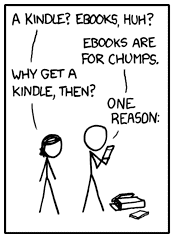
I’m a fan of the comic strip XKCD. So I was delighted when the cartoonist did a special edition that was all about the Kindle.
“Even if I spend months broke and drunk in a strange city, I’ll still be able to use Wikipedia and Wikitravel to learn about anything I need…”
Ironically, it’s very hard to read that comic on your Kindle (though its dialogue is almost legible if you surf straight to the image.) But, to give away the punchline, the female character decides there’s something suspiciously familiar about the idea of being able to learn anything anywhere. And when she examines the Kindle more closely, she makes a startling discovery: it’s actually The Hitchhiker’s Guide to the Galaxy.
For those of you who haven’t read the book, it describes a near-magical, all-knowing guidebook that would be crucial if, say, your home planet Earth was destroyed, and you had to navigate through all the other strange alien civilizations. It’s the perfect metaphor for the Kindle’s unlimited (and free) internet access, though I first read that cartoon before I’d even purchased my Kindle. But I still remember it every time I switch to Wikipedia to look up crucial context for the classic books I’m reading. (“Was this book popular in its time? How old was its author…?”)
I even added this capability to yesterday’s list of my favorite Kindle tips and tricks. (It’s possible to instantly search Wikipedia for any topic just by typing @wiki after hitting the Search button.) But the cartoonist’s joke has a special resonance for me, because I’d interviewed Douglas Adams, the author of The Hitchhiker’s Guide to the Galaxy, just a few weeks before his death in 2001. He’d lived long enough to see a wonderful sight — his six-year-old daughter, pushing her doll’s baby stroller while mimicking the voice of the GPS system in her daddy’s car. And I sometimes wonder what he would’ve thought of the Kindle. “Anything that’s invented after you’re 35 is against the natural order of things,” Adams had joked, while introducing, of course, a contradicting corollary. “Anything that’s in the world when you’re born is considered ordinary and normal.”
I’ve always assumed that Adams would eventually come around to the idea of using a digital reader. But regardless of Adams’ opinion, the magic of the internet at least lets us peek into the thoughts of the cartoonist who draws XKCD. If you hold your mouse over his cartoons, you’ll discover that the cartoonist leaves behind an extra personal statement for every cartoon. (For example, “Now that the Apple Store is getting rid of DRM, Cory Doctorow will get rid of his Steve Jobs voodoo doll…”) So what was his message for his Kindle cartoon?
“I’m happy with my Kindle 2 so far, but if they cut off the free Wikipedia browsing, I plan to show up drunk on Jeff Bezos’s lawn and refuse to leave!”
Or check out the Kindle version of The Hitchhiker’s Guide to the Galaxy.